I just noticed that I’ve posted over 2,000 times on AgWired. It’s a milestone! That’s a lot of pictures, interviews, links, notices and other types of information on the business of agrimarketing.
The very first version of AgWired was installed in August of 2004 but I didn’t get in the blogging groove until March of 2005. I think my daily posting average works out to around 4 posts a day, 7 days a week.
Ahh, those beginning days. Not only did I wonder what I’d gotten myself into, I can’t count how many of you wondered too and often said so! Well, hopefully the picture is getting clearer.
I know I’ve said it before but I want to thank everyone who has supported me. Your encouragement and all the ways you’ve found to provide support mean more than I can say. I do promise to continue developing AgWired and the agricultural use of the new media tools. As my good friend from Colorado likes to say, “Onward and upward.”
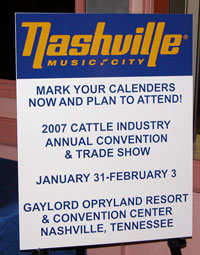 It’s never too early to promote the next major event on the cattle industry calendar.
It’s never too early to promote the next major event on the cattle industry calendar.

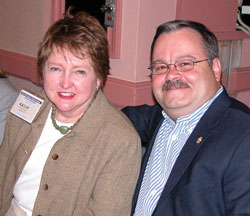 You never know who you’ll run into at a meeting like this.
You never know who you’ll run into at a meeting like this.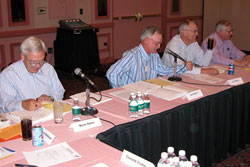 One of the early meetings here at the Cattle Industry Summer Conference is the Beef Board Executive Committee.
One of the early meetings here at the Cattle Industry Summer Conference is the Beef Board Executive Committee.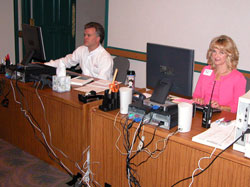 The media room is supervised by Joe Schuele and Grace Webb. Here they are hard at work making sure the agribloggers and farm podcasters and other media types are getting what they need.
The media room is supervised by Joe Schuele and Grace Webb. Here they are hard at work making sure the agribloggers and farm podcasters and other media types are getting what they need.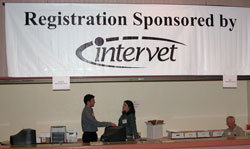 It sure doesn’t look very busy here at the registration desk in Reno.
It sure doesn’t look very busy here at the registration desk in Reno. The ZimmCast is coming to you this week from Reno, Nevada and the Cattle Industry Summer Conference. For your listening pleasure I interviewed the Chairman of the
The ZimmCast is coming to you this week from Reno, Nevada and the Cattle Industry Summer Conference. For your listening pleasure I interviewed the Chairman of the 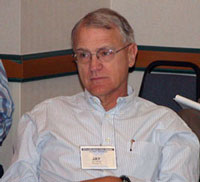 I asked Jay to explain what the Beef Board hopes to accomplish at this meeting. He says the budget is one of the main jobs they get done. Looking ahead to the new year he says that reaching young people with a message about beef is a priority since research has shown that their awareness level isn’t as high as adults.
I asked Jay to explain what the Beef Board hopes to accomplish at this meeting. He says the budget is one of the main jobs they get done. Looking ahead to the new year he says that reaching young people with a message about beef is a priority since research has shown that their awareness level isn’t as high as adults.
 Here’s a lot of what you see around town here in Reno. I came in a day early for the Cattle Industry Summer Conference because of flight availability and cost. So, it’s been nice to relax a little.
Here’s a lot of what you see around town here in Reno. I came in a day early for the Cattle Industry Summer Conference because of flight availability and cost. So, it’s been nice to relax a little. The
The  Our Agriculture Deputy Secretary Chuck Conner announced one importer alternate to serve on the
Our Agriculture Deputy Secretary Chuck Conner announced one importer alternate to serve on the